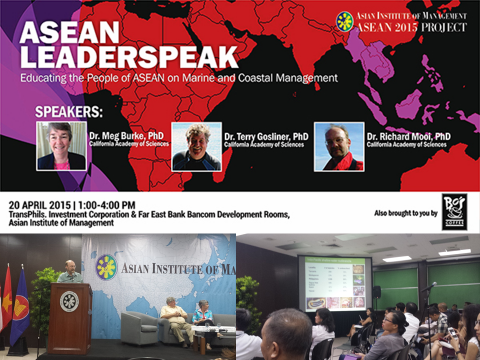“Citizen Science” is the key: How everyone can help in protecting our marine and coastal resources

The Safe Cities Index 2015: Assessing Urban Security in the Digital Age
December 9, 2016
Global Risks 2015
December 9, 2016“Citizen Science” is the key: How everyone can help in protecting our marine and coastal resources

by JC Yokingco and AV Gabriel
Date posted: April 23, 2015
The OML Center participated in the 9th ASEAN LEADERSPEAK entitled “Educating the People of the ASEAN on Marine and Coastal Management” last April 20, 2015 at the Asian Institute of Management (AIM), Makati City. The forum was organized by the AIM ASEAN 2015 Project headed by President Steven J. DeKrey, PhD and Mr. Federico M. Macaranas, PhD. It was held with the objective of increasing awareness on marine and coastal management. It featured three scientists from the California Academy of Sciences (CAS) namely Meg Burke, PhD, Terry Gosliner, PhD and Richard Mooi, PhD. They shared about their experiences and researches on marine resources in the Philippines and how ordinary individuals can participate in its conservation and protection.
One of the ways individuals can actively participate in the prevention of marine and coastal degradation is through what Dr. Mooi termed as “Citizen Science”. Citizen Science involves ordinary individuals in the monitoring of our marine resources for any activity that may cause harm to it. One of the ways this can be done is through eco-tourism, as mentioned by Dr. Burke. She emphasized during the open forum that by experiencing the beauty of our oceans individuals may be inspired to protect it.
The lecture of Dr. Mooi was also able to touch the topic of climate change and its impacts on the marine environment. He mentioned that the effects of climate change such as rising sea temperature and ocean acidification are causing imbalances in the marine ecosystem. High susceptibility to diseases, and increased predation and competition among marine organisms are few of the possible negative effects of the changing climatic conditions. Given that climate change is caused by anthropogenic activities, pushing for continuous efforts on climate mitigation can also help protect the marine environment.
With a coastline spanning 173,000 km., the Philippines’ marine and coastal areas have been the source of livelihood for many communities in the country. Filipinos are very dependent on these resources for survival and well-being; thus unfavourable changes in the marine environment and its resources will greatly affect them. Fortunately, through the active participation of every individual, the conservation and protection of these resources are still attainable.
